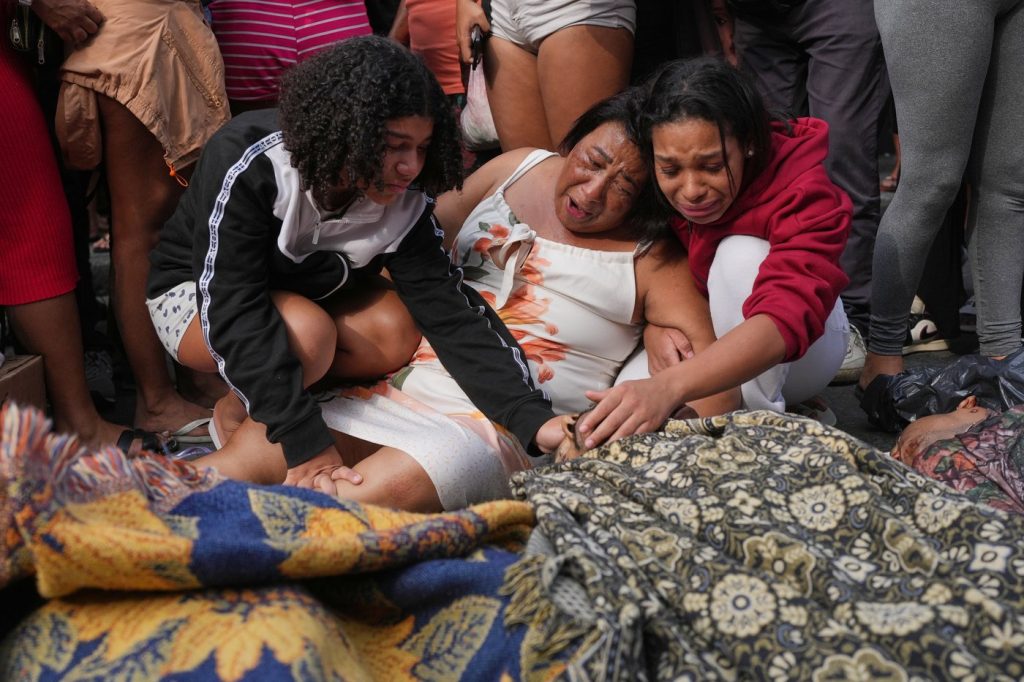RIO DE JANEIRO (AP) – Families of those killed in a recent police raid by Rio de Janeiro authorities began holding funerals on Thursday, as the community struggled to cope with the aftermath of violence that left a significant number of casualties. Residents expressed outrage at the actions of law enforcement, accusing them of employing excessive force, torture, and extrajudicial killings during the operation.
The tragic events unfolded in the Vila Cruzeiro favela, where the bodies of victims were displayed in a row just a day prior. Many residents were overcome with shock, grief, and anger as government officials arrived to listen to the community’s demands.
According to a report from Rio de Janeiro's public defenders’ office, at least 132 individuals were killed during the operation on Tuesday, including four policemen. The incident has been described as one of the most violent police operations in Rio’s history, prompting widespread condemnation from human rights organizations and scrutiny from various authorities, including Brazil's Supreme Court.
Despite the chaotic scene, everyday activities began to resume in the neighborhood as some shops and restaurants reopened. Monique Santiliano, a local nail salon owner, spoke to the media, stating, “I came to work because I have to, but my mental health is shattered.” She went on to assert, “This wasn’t an operation; these were assassinations. They didn’t come to arrest; they came to kill,” reflecting the sentiments of many community members.
Rio's conservative governor, Claudio Castro, described the operation as a success while framing it as a war against “narco-terrorism,” a term reminiscent of the Trump administration's approach to drug trafficking in Latin America. However, Human Rights Minister Macaé Evaristo contradicted this statement, emphasizing that the fight against organized crime should focus on financiers and masterminds rather than vulnerable communities.
The police raid, involving approximately 2,500 officers and soldiers, targeted the Red Command gang in the Complexo de Alemao and Complexo da Penha favelas. The violence escalated as gang members retaliated with gunfire, resulting in scenes of chaos across Rio de Janeiro.
While some citizens, especially right-wing politicians and voters, praised the operation, doubts persisted regarding its effectiveness. Critics pointed out that the high death toll, including a significant number of suspects compared to police fatalities, raises serious questions about the nature of the operation. Otoni de Paula, a conservative lawmaker, remarked, “I think we’re dealing with an ambush whose sole objective was execution. We cannot think that the state can grant the police the right to kill anyone.”
Residents voiced their concerns about the conditions of the bodies found, with reports of decapitation and other brutalities. Ana Tobossi, a local activist, highlighted the normalization of such violence, cautioning that if it is accepted as a standard, it could recur elsewhere in Brazil.
The raid was intended to disrupt the Red Command's leadership and prevent its territorial expansion, a group that has been increasingly influential in Brazilian organized crime, including in the Amazon region. Paulo Roberto, a 16-year-old street vendor near the Maracana football stadium, expressed his fears that such violence would deter visitors to the favelas, further stigmatizing their communities.
As Thursday progressed, families began to bury their dead. In the western zone of Rio, a police officer was laid to rest, while the funeral for 22-year-old Cauan Fernandes do Carmo Soares, a resident of Complexo de Alemao, was held nearby, with relatives lamenting their loss. His sister, Grasiele, remarked, “These boys have a father, a mother, sisters, and brothers. My family is destroyed.”











